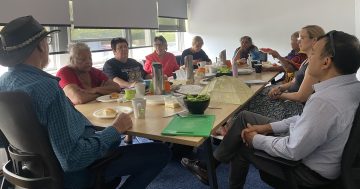
National Multicultural Festival. Photo: National Multicultural Festival Twitter.
With the proportion of overseas-born residents rising rapidly and one-in-four Canberrans speaking a language other than English at home, the ACT is growing to be a truly multicultural city.
As part of a coordinated approach to the city’s growing multi-culture, the ACT Government has announced it will introduce a new law to demonstrate the importance of multiculturalism in our community, and is inviting all Canberrans to have a say and help develop the new legislation.
In a statement released on Monday (19 April), the Minister for Multicultural Affairs Tara Cheyne said the government intends to create a Multicultural Charter, codifying the key principles of a successful multicultural society, enshrining into law the Multicultural Advisory Council and providing reporting mechanisms to ensure accountability to these principles.
“With one-in-four Canberrans born overseas, diversity in our community is our strength,” Ms Cheyne said.
“As a city and as a people, we are committed to multiculturalism, but we know that multiculturalism is a shared responsibility. The development of a Multicultural Recognition Act signifies the value that we as a community place on multiculturalism in the ACT.”
The discussion paper, Towards a Multicultural Recognition Act for the Australian Capital Territory, was launched by Ms Cheyne, forming the basis for community consultation during April and early May to inform the development of the legislation during 2021.
“This legislation should be proudly owned by the entire ACT community. The views of all Canberrans on this important work are not only valued but critical to its success. I encourage all Canberrans to contribute to the development of this Act,” Ms Cheyne said.
Canberra Multicultural Community Forum chair Chin Wong said she welcomed the announcement and hopes the government will consult widely and allow the multicultural community to take the lead.
“We are encouraging the community to register and use this opportunity to have a say.”
Ms Wong said it is important for the legislation to recognise the issues and be prepared to act on them.
“This is an opportunity to make awareness of racism a top priority and to deliver education and awareness programs to the wider community. There is no point in having an Act if there is no action.”
Action, as well as words, is also a priority for Fair Canberra president Nic Manikis. He says the legislation will be good for the community, “but what we also need is the practical stuff, language resources, venues for communities to gather, and racism stamped out on all levels. At the end of the day, it will be the practical things that count.”
Federation of Indian Associations of ACT president Sunita Dhindsa also welcomed the announcement saying, “the government has done the right thing by starting with engaging communities to hear their views about the Act, Charter and the Multicultural Recognition Act”.
She says the act should also encourage the celebration of the ACT as a successful multicultural society in more ways than just the National Multicultural Festival.
“It needs to mandate greater exposure and greater awareness, appreciation and acceptance of cultural and linguistic diversity through the school curriculum, provide measures for implementation, and formalise a date for review to create improvements.
“The Multicultural Advisory Council should have people that have relevant skills and experience, and be representative of the cultural and linguistic diversity of our society and needs of the multicultural communities.”
Helping ACT president Mohammed Ali said the law will mark a new chapter in the ACT.
“While this type of legislation has been in place in other states for a while, it will be great to see that whatever race, colour or country you are originally from, when you are an ACT citizen, you are recognised as a valued part of our society, with equal recognition for all. I am thankful to Tara Cheyne for getting onto this straight away.”
You can have your say by completing an online survey, attending a community workshop, or sending feedback directly to the ACT Government. For more information, visit YourSay.





















